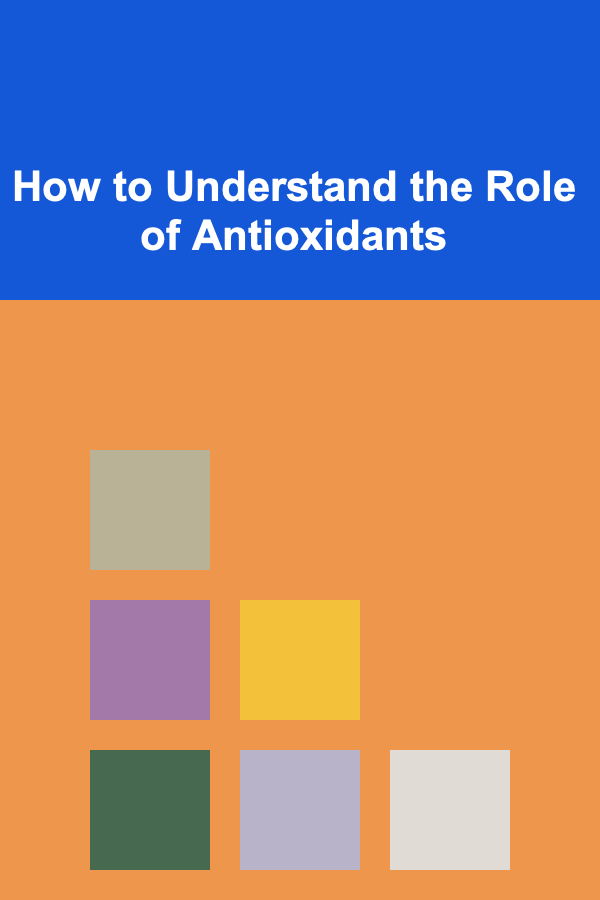
How to Understand the Role of Antioxidants
ebook include PDF & Audio bundle (Micro Guide)
$12.99$5.99
Limited Time Offer! Order within the next:

In the quest for better health, we often hear about antioxidants as essential compounds that protect our body from damage and prevent diseases. From skincare products to nutritional supplements, antioxidants are often marketed as the key to longevity, glowing skin, and disease prevention. But what exactly are antioxidants? How do they function in our body, and why are they so crucial for our health?
This article delves deep into understanding the role of antioxidants, how they work at the cellular level, their health benefits, and where we can find them in our everyday diet. We will also explore the impact of antioxidants on aging, chronic diseases, and overall well-being.
What Are Antioxidants?
Antioxidants are molecules that prevent or slow down the oxidation process in our body. Oxidation is a chemical reaction in which electrons are transferred between molecules. While oxidation is a natural and necessary process that occurs in the body, it can also result in the formation of free radicals. Free radicals are unstable molecules that have unpaired electrons, making them highly reactive. These free radicals can damage healthy cells, proteins, and even DNA, leading to oxidative stress, which is associated with a variety of health conditions.
Antioxidants neutralize free radicals by donating an electron, thus preventing them from causing harm. Essentially, antioxidants act as protective agents, reducing the risk of cellular damage and preserving the integrity of our cells.
Types of Antioxidants
There are several types of antioxidants, each playing a unique role in protecting the body. Some are naturally produced by our body, while others are obtained through our diet. Below are the primary categories of antioxidants:
1. Enzymatic Antioxidants
These antioxidants are enzymes produced by the body that play a critical role in neutralizing free radicals. They are found within the cells and help to eliminate free radicals before they cause damage. Examples of enzymatic antioxidants include:
- Superoxide Dismutase (SOD): This enzyme catalyzes the conversion of superoxide radicals into less harmful molecules, such as hydrogen peroxide.
- Catalase: Catalase breaks down hydrogen peroxide into water and oxygen, neutralizing a potent free radical.
- Glutathione Peroxidase: This enzyme helps reduce lipid peroxides to non-toxic substances, playing a role in preventing damage to cell membranes.
2. Non-Enzymatic Antioxidants
These antioxidants are typically obtained from food and do not require enzymatic activity to exert their effects. Some of the most well-known non-enzymatic antioxidants include:
- Vitamin C: A water-soluble antioxidant that is crucial in protecting cells and tissues from oxidative damage. It also helps regenerate other antioxidants like vitamin E.
- Vitamin E: A fat-soluble antioxidant that protects cell membranes and lipids from oxidative damage.
- Beta-carotene: A precursor to vitamin A, beta-carotene is a powerful antioxidant found in fruits and vegetables.
- Flavonoids: These are plant compounds with antioxidant properties that help combat oxidative stress. They are commonly found in fruits, vegetables, and tea.
3. Phytochemicals
Phytochemicals are bioactive compounds found in plants that have antioxidant effects. Some common examples of phytochemicals include:
- Polyphenols: Found in foods like green tea, berries, and red wine, polyphenols are potent antioxidants that have been linked to numerous health benefits, including the reduction of inflammation and the prevention of heart disease.
- Lignans and Isoflavones: Found in seeds, whole grains, and soy products, these compounds have been shown to have antioxidant properties, contributing to heart health and cancer prevention.
The Science Behind Oxidative Stress
Oxidative stress occurs when there is an imbalance between free radicals and antioxidants in the body. Free radicals are produced as byproducts of normal metabolic processes, but they can also be generated by external factors such as environmental pollutants, UV radiation, smoking, and poor diet. When free radicals outnumber antioxidants, they can cause significant damage to our cells, leading to inflammation and the development of chronic diseases.
Free Radical Damage and Aging
One of the most well-known effects of oxidative stress is its role in the aging process. Free radical damage accumulates over time, leading to the breakdown of cellular structures and functions. This contributes to visible signs of aging such as wrinkles, sagging skin, and loss of elasticity. Oxidative stress is also linked to the gradual deterioration of various bodily systems, including the nervous system, cardiovascular system, and immune system.
In particular, oxidative stress is thought to play a central role in age-related diseases such as Alzheimer's disease, Parkinson's disease, and macular degeneration. The accumulation of free radical-induced damage accelerates the aging process, making antioxidants crucial for maintaining youthfulness and vitality.
Free Radical Damage and Disease
Beyond aging, oxidative stress is implicated in a wide range of chronic diseases. Research has shown that free radicals contribute to the development and progression of various conditions, including:
- Cardiovascular Diseases: Oxidative stress can damage blood vessels, leading to the formation of plaques in arteries and increasing the risk of heart attacks and strokes.
- Cancer: Free radicals can cause mutations in DNA, which can eventually lead to the development of cancer. The DNA damage caused by oxidative stress is believed to be a major factor in cancer initiation and progression.
- Diabetes: Oxidative stress is involved in insulin resistance and beta-cell dysfunction in diabetes, which contributes to the development of the disease.
- Inflammatory Disorders: Chronic oxidative stress can lead to persistent inflammation, which is associated with conditions like arthritis, asthma, and inflammatory bowel disease.
The Health Benefits of Antioxidants
Given the role antioxidants play in neutralizing free radicals, it's no surprise that they offer numerous health benefits. Some of the most prominent benefits include:
1. Preventing Premature Aging
Antioxidants are often touted as the key to slowing down the aging process. By protecting the skin and cells from oxidative damage, antioxidants can reduce the appearance of wrinkles and age spots, promote healthier skin, and maintain the elasticity of tissues. For example, vitamin C is known to stimulate collagen production, which helps to maintain skin firmness and elasticity.
2. Boosting Immune Function
Antioxidants such as vitamin C and vitamin E are essential for maintaining a healthy immune system. They help protect immune cells from oxidative damage and support their ability to fight off infections. By reducing oxidative stress, antioxidants enhance the immune system's ability to respond to pathogens and protect the body from illness.
3. Supporting Heart Health
Antioxidants play a crucial role in protecting the cardiovascular system. They help reduce oxidative stress and inflammation in the blood vessels, preventing the buildup of plaque and reducing the risk of heart disease. For instance, flavonoids found in foods like dark chocolate and citrus fruits have been shown to improve blood vessel function and reduce blood pressure.
4. Reducing the Risk of Chronic Diseases
As mentioned earlier, oxidative stress is linked to many chronic diseases, including cancer, diabetes, and neurodegenerative diseases. Antioxidants help to protect cells from DNA damage, reduce inflammation, and promote overall cellular health, thus lowering the risk of developing these diseases. The intake of antioxidants from fruits, vegetables, and other plant-based foods has been associated with a reduced risk of chronic conditions and improved overall health.
5. Improving Mental Health
Oxidative stress also affects brain health. Research suggests that free radicals contribute to neurodegenerative diseases like Alzheimer's and Parkinson's disease. Antioxidants may help protect the brain from oxidative damage, improve cognitive function, and reduce the risk of age-related mental decline. Studies have shown that regular intake of antioxidants such as vitamin E and polyphenols can have a positive effect on memory and cognitive health.
How to Get Antioxidants in Your Diet
The best way to increase your antioxidant intake is through a balanced diet that is rich in fruits, vegetables, and other whole foods. Antioxidants are abundant in colorful foods such as berries, leafy greens, nuts, seeds, and citrus fruits. Here are some tips for incorporating antioxidants into your diet:
- Eat a variety of fruits and vegetables: Include a diverse range of colorful produce in your meals, as different fruits and vegetables contain different types of antioxidants.
- Consume whole grains: Whole grains like oats, quinoa, and brown rice are rich in antioxidants and other essential nutrients.
- Include nuts and seeds: Almonds, walnuts, flaxseeds, and chia seeds are great sources of antioxidants.
- Drink green tea: Green tea is packed with polyphenols, which have potent antioxidant properties. Regular consumption can help protect your cells from oxidative damage.
- Limit processed foods and sugars: Processed foods and refined sugars contribute to oxidative stress. Aim to reduce your intake of these foods for better overall health.
Conclusion
Antioxidants are vital for protecting our cells and tissues from oxidative stress and preventing the damage caused by free radicals. By neutralizing these harmful molecules, antioxidants support our overall health, reduce the risk of chronic diseases, and promote longevity. Whether through the consumption of nutrient-rich foods or through supplementation, antioxidants play a central role in maintaining our health and well-being.
Incorporating antioxidant-rich foods into your daily diet is an easy and effective way to harness their protective benefits. However, it is important to remember that balance is key. Too much of anything, even antioxidants, can have negative effects. As with any aspect of health, moderation and a well-rounded approach to nutrition are essential.

Beginner's Guide to Using Google Docs
Read More
Earn Passive Income with Deep Learning: A Beginner's Guide
Read More
How to Create a Checklist for Addressing Employee Performance Gaps
Read More
How to Create a Kitchen Cabinet Organization Strategy
Read More
Smart Ways to Break the Habit: Cutting Down on Impulse Buying
Read More
The Content Strategist's Playbook: Crafting Successful Digital Strategies
Read MoreOther Products

Beginner's Guide to Using Google Docs
Read More
Earn Passive Income with Deep Learning: A Beginner's Guide
Read More
How to Create a Checklist for Addressing Employee Performance Gaps
Read More
How to Create a Kitchen Cabinet Organization Strategy
Read More
Smart Ways to Break the Habit: Cutting Down on Impulse Buying
Read More